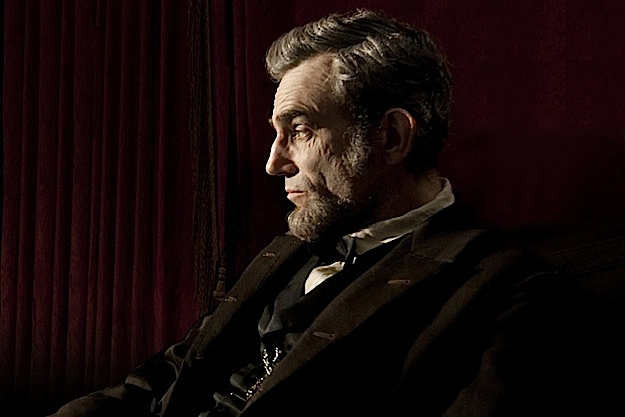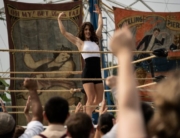
Daniel Day-Lewis in LINCOLN (David James)
![]() This isn’t your typical Spielberg pic. Dense, talky, and historically compounded, Lincoln forgoes his celebrated pattern of finding the modest human tale within the larger context and instead centers on one of the biggest figures in American history during one of the country’s most decisive moments. This is the big story. Spielberg—himself one of the biggest figures in film history—may have helmed major historical reenactments before (Schindler’s List, Saving Private Ryan), but in the previous cases he envisioned events from a uniquely minute perspective. He teams again with the screenwriter and playwright Tony Kushner (Munich), who based the screenplay on Doris Kearns Goodwin’s Team of Rivals, and, like many directors before him, finds an effective muse in the indomitable Daniel Day-Lewis for the epic lead role.
This isn’t your typical Spielberg pic. Dense, talky, and historically compounded, Lincoln forgoes his celebrated pattern of finding the modest human tale within the larger context and instead centers on one of the biggest figures in American history during one of the country’s most decisive moments. This is the big story. Spielberg—himself one of the biggest figures in film history—may have helmed major historical reenactments before (Schindler’s List, Saving Private Ryan), but in the previous cases he envisioned events from a uniquely minute perspective. He teams again with the screenwriter and playwright Tony Kushner (Munich), who based the screenplay on Doris Kearns Goodwin’s Team of Rivals, and, like many directors before him, finds an effective muse in the indomitable Daniel Day-Lewis for the epic lead role.
Not to say there’s nothing small about the film. In fact, we are several times privy to quiet moments of Lincoln’s life not exhaustively recorded by countless historians. Overall, though, there’s a marked difference between following Ryan’s Captain Miller around war-torn Europe and being introduced to a young Albert Narracott in the more recent Warhorse. This is Abe Lincoln we’re talking about here.
Kushner drafted an initial script that spanned a much longer period of Lincoln’s tenure, but Spielberg’s instinct was to focus on the tumultuous period of time (not to say all of Lincoln’s presidential years were not tumultuous) in which the 13th Amendment outlawing slavery and involuntary servitude was passed in the House of Representatives. (The Emancipation Proclamation was an executive order, not a piece of traditional legislation, let alone an amendment to the Constitution.) Amid the bloodiest war the country had ever seen, or has ever seen since, the greatest battle was perhaps a political one, on the floor of the House in the first weeks of 1865, snug between the Gettysburg and the Second Inaugural Addresses.
The film will appeal to history buffs without a doubt, though it may feel a little stuffy—at its lowest points like an historical fashion show. Watch for details like the chinoiserie of the era, and have a laugh at the plethora of creative facial hair. The accurately researched and well-executed images, though, are resonant and compelling as usual. The key players are cast nicely, even if there are a few too many of them to delve deeply. Tommy Lee Jones is excellent as the gruff and self-reliant Thaddeus Stevens, pillar of the House and fierce abolitionist (and an unmarried man, who Kushner and Spielberg posit to have been sleeping with his black housekeeper). David Strathairn is William Seward, Lincoln’s keen secretary of state and chief political rival before his election, and Joseph Gordon-Levitt plays Robert Lincoln, the frustrated eldest son who defies his father’s wish and enlists with the Union army. A host of recognizable characters speckle each scene, but pay particular attention to Jackie Earle Hayley as Confederate Vice President Alex Stephens and Jared Harris as Ulysses S. Grant.
The surprise in the cast is Sally Field as the historically mercurial Mary Todd Lincoln. Field reportedly begged incessantly for the part, perhaps attempting to demonstrate Mary’s political tenacity. The campaign worked on Spielberg, yet her rendering might be deemed a tad revisionist. Not nearly as heavy, plain, bi-polar, or unlikeable as Mary is frequently said to have been, Field finds a very bland humanity in the woman that adds angst to her husband’s existing struggles but almost nothing else to the story. In fact, her portrayal of Mary as a loyal sidekick far less complicated than usually described may be a blessing in disguise in an already overstuffed narrative. (Team of Rivals is almost 900 pages long.)
And then there is Daniel Day-Lewis as Abraham Lincoln. It’s not just the physical transformation in his posture or gait, although that aspect of it is unbelievable, but also in his high, though not exactly “squeaky,” speaking voice. This Lincoln sounds like a colloquial Midwest pragmatist with the ghost of a romantic New England storyteller. In the nuances of the accent alone, Day-Lewis reminds us of the century of American nation-building from which Abe Lincoln drew his political genius. But apart from the physical adjustments, one gets the sense that Day-Lewis actually believes what Lincoln believed. He desires the same things. It’s the kind of performance I don’t think one walks away from unchanged. Not only will this be hard to beat as the defining portrayal of Lincoln for many years to come, but I also don’t think this actor is dropping a lot of the Lincoln’s traits from his own personality any time soon. This is the kind of character that stays with everyone.
So it’s a departure for this director, but a worthy one, and I guess a costume drama, but obviously not your cut-rate miniseries fare. Lincoln may not represent a new gold standard for the president’s biography, nor for the biopic itself, but I can say with full confidence that this is the Lincoln biopic against which all others will be judged.






Leave A Comment